- Home
- Roger Zelazny
Madwand (Illustrated) Page 21
Madwand (Illustrated) Read online
Page 21
I had been hurriedly assembled from the raw stuff of creation in this world by the sorcerer Det Morson on the day of his death—almost within minutes of it, actually. So rushed had he been by the unusually speedy advance of his enemies that he had been unable properly to conclude the work, to charge me in full with all of the necessary restrictions, compulsions and promptings. He rushed off to tend to his death without quite completing his spell and setting into motion all of those reflexes he had instilled. Or telling me who I was. Conscientious in the extreme, I realized, I had been trying to figure these matters out for myself.
It is very pleasing to learn of one’s importance in the scheme of things.
And it is a good thing, in a very real sense, to have made one’s own way in the world, unlike those others who came full-furnished with stocks of intellectual and emotional equipment suiting them for their comfortable niches in life and requiring never a second thought. Consider . . .
Det rushed off. I see now why he did not release me. Not only was I incomplete, without that final pronunciation of my name, but my infant strength would have been of small use against that army of besiegers and their wizard would doubtless have put me aside, likely rendering me useless for my true purposes. For how long after the fall of Rondoval I remained, trapped by the paraphernalia of the spell in that small chamber, I do not really know. Years, perhaps; until the natural erosions of time wore away the designs which barred my exit from that room. No true hardship this; for my existence at that time was next to vegetable in character, not at all the inquiring and highly sophisticated state of mind I now enjoy. In the years which followed, I learned the geography of the place thoroughly, though I never questioned the nature of the force which kept me anchored to it—not even when I found that my modest forays into the countryside were invariably accompanied by an apprehension which was only allayed when I returned to the castle’s confines. But I was young and naive. There were so many questions I did not yet ask. I slithered along rafters. I danced among moonbeams. Life was idyllic.
It was not until Pol’s arrival and all of the activities which ensued that anything like a true curiosity was aroused in me. Beyond the vermin and some then incomprehensible dwellers upon other planes, my only experience with sentients had come from the minds of the sleeping dragons and their companions—hardly the most stimulating intellectual fare. But I was suddenly deluged with thoughts and words, and the ideas which lay behind them. It was then that I came into self-consciousness and first began to explore the enigmas of my own condition.
I know now that I was drawn to Pol because of his dragonmark, and any of the horde of other cues which served to identify him to me at some primal level with my first accurséd master. I did not know, however, that this was a part of the design of my existence. In light of it, certain of my other actions became even more intelligible. Such as my animation of the corpse for purposes of conveying a message to Mouseglove. Such as my decision to depart Rondoval and follow Pol.
“Belphanior.” Delicious word.
As Pol lay semiconscious, gasping, aching, suffering from a number of burns, broken bones, sprains, abrasions., contusions and near-total fatigue, I realized that an important part of my mission in life involved his protection and I was pleased to have succeeded as well as I had, considering the handicap under which I was working. It gratified me that I had occasionally relieved the pressure of some of his more distressing dreams, not to mention sending Mouseglove after the scepter, without which he would almost certainly by now have been dead.
Yes, it pleased me that I had done the right things when I had acted, had reached so many proper conclusions by virtue of my own initiative rather than because of any standing order I was obliged to follow. As I considered the fallen form of Larick—also under my protection—as well as those of Ryle, Ibal and the rapidly tailing lady Vonnie, I was happy to know that by extension, as allies, I could also count them as being in my care. The philosophical vistas now opened to me seemed almost limitless.
Yes.
With the pronunciation of my name I was immediately aware of who and what I was:
I am the Curse of Rondoval (a technical term, that), existing to defend both the premises and the members of the House, and failing that, to avenge them.
I look upon it as a challenging, exciting and wonderful occupation.
It is with extreme gratitude that I now consider the fact that Det Morson, hard-pressed as he was there at the end, yet managed to find time for the creation of a good Curse.
As I watched Henry Spier and Vonnie swaying and staggering back and forth, hurling their remaining energies through intricate and deceptive patterns at one another in a conflict to determine the fate of my charges, not to mention that of the world, I realized that, despite the forces which had been thrown against him, the man had the edge and would doubtless in a few moments emerge victorious. It was instructive to follow his magical manipulations. There was genuine artistry there, as I understood it. The man had, after all, once been a peer and close friend of my accurséd master. It was, in this sense, unfortunate that he had become an enemy of Rondoval and, hence, the designated recipient of my wrath.
Which led me to another important train of considerations: With Det Morson dead these two decades and two heirs of Rondoval visible on the floor, who was his proper successor as my accurséd master? Larick was Pol’s senior, yet he had forsaken the family precincts to dwell at Avinconet. Pol, on the other hand, maintained his residence at the family seat and thus was more sensitive to the needs of Rondoval itself. Witness, his ongoing program of repair and renovation. The matter could, over the years, become very important when it came to the assigning of priorities in my work-schedule.
I resolved it finally in Pol’s favor. Possibly, ultimately, a sentimental choice. While I allowed myself to be swayed by the argument from residence, I was not unaware that my decision could easily have been colored by the fact that I knew Pol better than I did his brother and that I had not approved of Larick’s earlier actions against him. Or, to put it more simply, I liked Pol better.
I drifted near his twitching, recumbent form, and for the first time attempted direct communication with him.
Everything is all right now, accurséd master, I reported, except for a few details.
He began coughing just as Vonnie screamed, interfering with his acknowledgement.
I regarded Henry Spier once more, his face twisted and blackened, as he tied the final knots of his spell. I noted, too, that Ryle Merson was awake and struggling to raise one arm. Larick and Ibal were likely to remain unconscious for some time longer. Taisa was sitting up and looking very bewildered.
I reviewed a number of possible actions I might take against Spier, rejecting many—even the one which involved flooding the chamber by diverting a nearby underground stream, a course which possessed a great esthetic appeal for me.
Finally, the choices were narrowed to one and the only remaining detail involved my decision as to the proper color scheme.
Avocado, ranging to a very pale green, I finally decided.
XXII.
When Pol heard the voice in his head, he rolled onto his side and opened his eyes. He lacked the strength to do anything more. The situation appeared virtually unchanged so for as he could tell. Vonnie seemed no longer a young woman, but middle-aged and tired-looking. Spier also looked worn, but there was still some vitality in his gestures. A moment more and it appeared that the man would win.
There came a loud hissing sound from the back of the chamber. Spier glanced in that direction and his face froze. His hands halted in mid-gesture. Vonnie also looked that way, with identical results.
Pol struggled to turn his head, and when he succeeded he beheld a particularly ghastly materialization. It appeared to be the demon body he himself had briefly worn, taking rapid shape beside the table—headless. In place of a head, it wore a crown of flames—avocado, ranging to a very pale green.
Pol heard Taisa shriek. An
d from their changing expressions, it appeared that Spier and Vonnie each thought the other responsible for the phenomenon.
In that moment, a bit of light fled from between Ryle Merson’s cupped hands to fall upon Spier’s breast. Spier staggered back, gesturing as if to brush it away and casting a quick glance in Ryle’s direction.
Pol raised his hand and moved it as if engaged in a sorcerous manipulation, though the power was gone, the dragonmark still once again. Spier made a warding movement just as the voice boomed out:
“The Curse of Rondoval is upon you, Henry Spier!”
The flame-headed demon-form lurched forward, and Spier—all color fled from his lace—turned and seized the statuette, which he raised before him.
“I have served you!” he cried. “Now it’s your turn! Now, or never!”
There came a flash of light from Vonnie’s mirror, directed toward Spier, simultaneous with a heavy scraping sound from the direction of the table.
The light from the mirror did not reach Spier. Somewhere in the vicinity of the figurine—at arm’s length before him—it appeared to be absorbed. The jewels in the statuette suddenly shone like tiny, colored fires.
A dark shape rushed forward, racing the demon-form toward Spier. It passed the creature—a heavy wooden armchair from beside the table—passed Spier also, pivoted in midair, dropped and pushed forward, striking Spier behind the knees.
The sorcerer collapsed into the chair, still clutching the blazing icon.
The chair tilted backward and levitated rapidly, just as the Curse of Rondoval sprang toward it. It swung in a wide arc about the room and the fire-crowned avenger bounded after it.
It rushed at the wall, banked suddenly, then shot directly toward the window.
Belphanior recovered his balance, turned, and sprang after it, talons extended. He caught the edge of Spier’s long yellow cloak which trailed behind.
The chair jerked and Spier made a gagging sound, clawing at his throat with one hand. Then its clasp tore loose and the cloak fell away. The chair resumed its forward motion, picking up speed, and passed out through the window.
Pol heard a startled cry followed by a dragon’s roar. A moment later, there were gunshots. Then he heard Mouseglove cursing. He propped himself with one stiff arm and started to sway. He felt Ryle’s hand upon his shoulder, steadying him.
“Easy . . . ” Ryle said. “He’s been checked. We’re safe.”
Ryle helped him into a sitting position, then looked toward Taisa, Larick, Vonnie.
The old woman was sitting upon the floor, the mirror at her side. She held Ibal’s head in her lap and was speaking softly, almost crooning, above him. When she felt Ryle’s gaze, she raised one hand to cover her face. Ryle quickly looked away.
Larick was stirring again. Ryle rose slowly, ponderously, to his feet and made his way toward his daughter. Pol caught only one brief glimpse of his face.
“Accurséd master,” Belphanior said then, prostrating himself before him. “I have answered your summons. I apologize that the man escaped my wrath.”
“What—who are you?” Pol asked, moving his suddenly warm foot back from the bowed, avocado to pale green-flamed head. “And please rise.”
“Belphanior, the Curse of Rondoval, your servant,” he said, raising himself into a semi-erect stance.
“Really?”
“Yes. You called and I answered. I would have dismembered him for your delight, save for that unfair chair trick.”
“Perhaps you’ll have another opportunity one day,” Pol said. “But thank you for this service. It was timely, and well done.”
Belphanior handed him the yellow cloak.
“Your own garments are in need of repair. Perhaps the sorcerer’s robe . . . ”
“Thanks.”
Pol took it into his hands. The light fabric felt strange, yet at the same time familiar. There was a small patch of white on the inside, below the collar. He raised it and looked more closely.
CUSTOM-MADE IN HONG KONG ran the words upon it.
He almost dropped the cloak as he was taken by a sudden chill.
“May I assist you, accurséd master?”
“No. I’ll manage.”
He drew it about his shoulders and fastened it at the neck. He straightened his legs painfully, rising upon them. The ache in his left side grew stronger. Larick, too, was attempting to rise. He extended his hand. Larick looked at it for a moment, then took it and pulled himself up. He did not release it for a moment, however, but continued to stare at the dragonmark. Then he looked up at Pol’s hair.
“I never knew,” he said at last.
“I only learned at the last possible moment myself,” Pol said.
Over his shoulder, Pol saw that Mouseglove was seated upon the windowsill, staring. A moment later, the small man shouted something out the window and dropped to the floor.
“Moonbird couldn’t follow the chair,” he called out. “It was moving too fast.”
Pol nodded. As Mouseglove came toward him, he saw that Ryle and Taisa were also approaching.
Larick turned toward the woman, smiling. She moved past him, placed her arms about Pol’s neck and kissed him.
“Thank you,” she said, at last. “I thought this day would never come, till wandering in spirit I saw you brought here. I knew somehow that you would free me.”
As he gazed past her, Pol saw a peculiar look pass over Larick’s face. He disentangled himself quickly, pushed her gently back and bowed despite his aching side.
“I am pleased to have helped,” he said, “but it was hardly my doing alone. It was simply—circumstance.”
“You are modest.”
Pol turned away.
“We’d best see to Ibal and Vonnie immediately.”
The old sorcerer looked young again but was still unconscious. Vonnie’s beauty had for the most part returned and its enhancement continued as Pol watched. She smiled up at him.
“He’ll be all right,” she said. “I just wanted to keep him from awakening until the cosmetic spell was in place. We can repair the rejuvenation spells later.”
She picked up the magic mirror and regarded herself in it. She smiled.
“Vanity, I know,” she said. “Delightful thing.”
“Let us,” Ryle said, coming up beside them, “repair to more congenial quarters. Perhaps your servant can bring Ibal, Pol.”
“That will not be necessary,” Vonnie answered, holding the mirror before Ibal’s face.
Ibal’s eyes opened. He considered his reflection, then began to rise.
“Lead on,” she said. “We will follow.”
XXIII.
Night had fallen. In a large chamber in the castle Avinconet, six jeweled figurines were grouped at the center of a series of concentric circles painted upon the floor; among these circles and about them various Words and Signs had also been executed. It had taken the entire day to situate them so, for every possible thing that could have gone wrong—from spilled paint, mispronounced Words, incorrectly drawn figures, a series of earth tremors and troops of marauding vermin who had marred the pattern—had gone wrong.
At last, however, the final spell had been pronounced, the final line drawn, the final gesture executed. Immediately, the interference had ceased. The Keys were contained.
Now Pol, Larick, Ibal, Vonnie, Ryle, Taisa, Mouseglove and Belphanior sat, reclined, stood, paced, drifted as an invisible cloud, took refreshment, rested and conferred at the farther end of the large room.
“ . . . Then I don’t understand why they didn’t help Spier,” Mouseglove was saying.
“I believe that they were helping Spier all along,” Ryle replied, “but we finally exhausted them, too, for a little while. Long enough, though. Almost.”
“You say that, theoretically, he could still open the Gate with the one Key?” Mouseglove asked.
“He told Pol that he could, and I believe that he’s right. It would probably take a lot of effort, though. I just don’t kn
ow for certain. He’s the greatest living authority.”
“What now?” Larick asked, from where he sat beside Taisa who was looking at Pol who was looking at the book he held in his lap.
“They’re neutralized now, but I will not rest until all seven Keys are destroyed,” Ryle said. “They could still be stolen or freed somehow and the thing could start all over again.”
“I can guard them against mortal thieves for a time,” Mouseglove offered.
. . . And I against those of the other variety, Belphanior said from somewhere.
“But can they be destroyed?” Taisa asked. “After everything we tried on them earlier . . . ”
“Everything that exists has some weakness.” Ibal said, lowering his goblet. “We will have to explore carefully.”
“It’s in here,” Pol said. “Far back, and scattered, but our father did leave some clues. I’ve already come across a few new ones. I am going to have to read through the entire thing now and put them all together. It will take a while . . . ”
“It must be done,” Larick said.
“Yes.”
“I cannot help but admire their vision,” Ibal said. “You know, if I were Madwand rather than a traditionally trained man of the Art, I don’t believe that I would be sitting here with you.”
Ryle looked at him sharply.
Ibal chuckled.
“Don’t give me that look,” he said. “You were in on it at the beginning, till you learned that one important fact. And if you had been Madwand, what then, Ryle?”
Ryle looked away.
“I can’t deny it,” he said. “It’s wrong, but I hate them as much for shattering that vision as for anything else.”
“I did not say it just to irritate you,” Ibal continued, “but as a caution: Trust no more Madwands than those here present—unless they be well-proven.”
“You think Spier may now seek allies?”
“Wouldn’t you?”
“I believe I am onto something,” Pol said, turning a page. “I don’t think this is going to be easy . . . ”

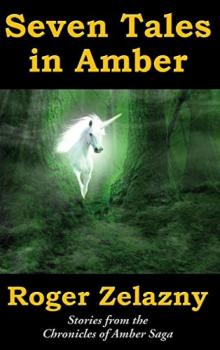 Seven Tales in Amber
Seven Tales in Amber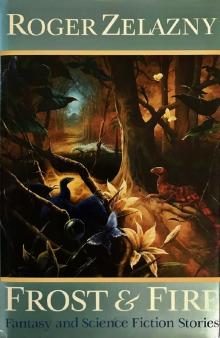 Frost and Fire
Frost and Fire Doorways in the Sand
Doorways in the Sand Unicorn Variation
Unicorn Variation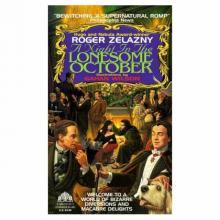 A Night in the Lonesome October
A Night in the Lonesome October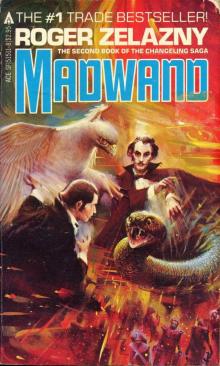 Madwand
Madwand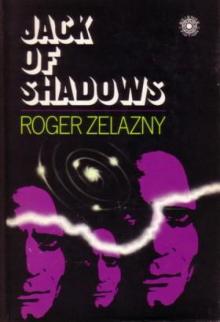 Jack Of Shadows
Jack Of Shadows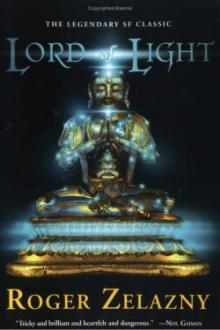 Lord of Light
Lord of Light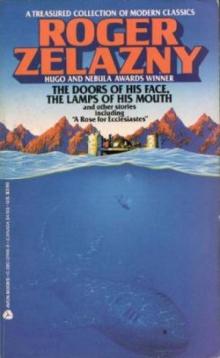 The Doors of His Face, The Lamps of His Mouth and Other Stories
The Doors of His Face, The Lamps of His Mouth and Other Stories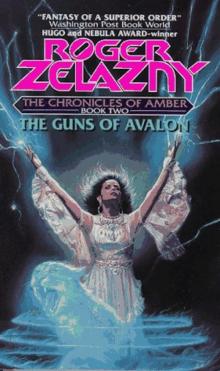 Guns Of Avalon tcoa-2
Guns Of Avalon tcoa-2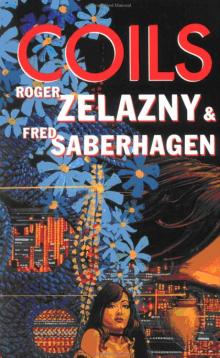 Coils
Coils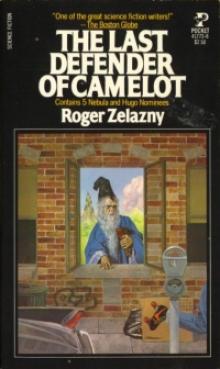 The Last Defender Of Camelot
The Last Defender Of Camelot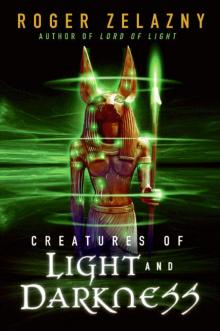 Creatures of Light and Darkness
Creatures of Light and Darkness This Immortal
This Immortal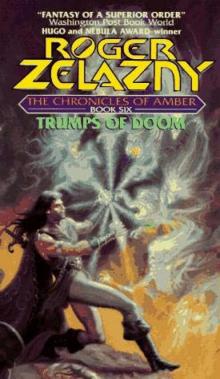 Trumps of doom tcoa-6
Trumps of doom tcoa-6 The Dream Master
The Dream Master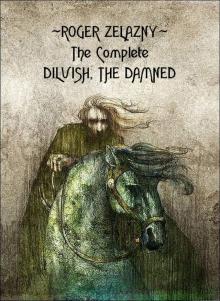 The Complete Dilvish, The Damned
The Complete Dilvish, The Damned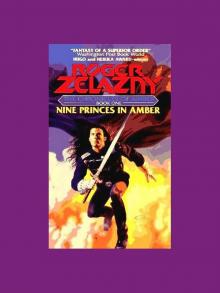 Nine Princes in Amber
Nine Princes in Amber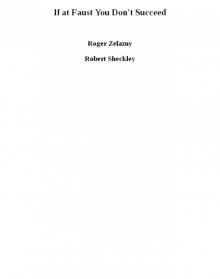 If at Faust You Don't Succeed
If at Faust You Don't Succeed Here there be dragons
Here there be dragons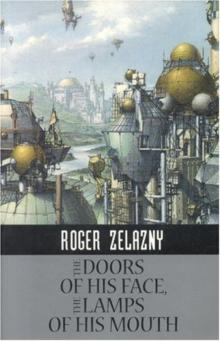 The Doors Of His Face, The Lamps Of His Mouth
The Doors Of His Face, The Lamps Of His Mouth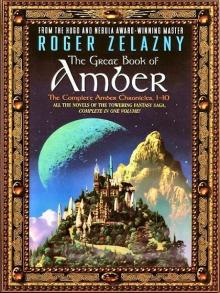 The Great Book of Amber - Chronicles 1-10
The Great Book of Amber - Chronicles 1-10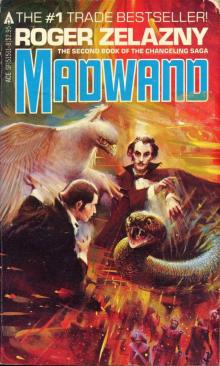 Madwand (Illustrated)
Madwand (Illustrated)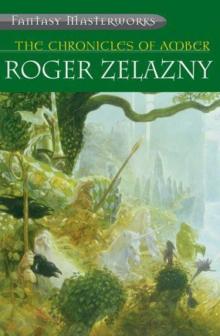 The Chronicles of Amber
The Chronicles of Amber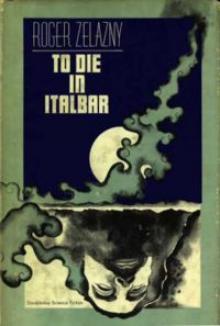 To Die In Italbar
To Die In Italbar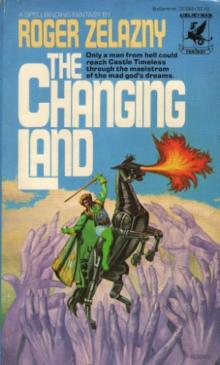 The Changing Land
The Changing Land The Furies
The Furies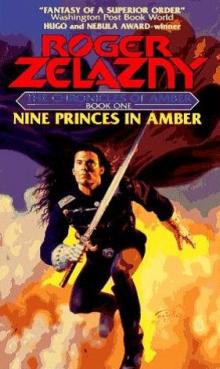 Nine Princes In Amber tcoa-1
Nine Princes In Amber tcoa-1 Last Of The Wild Ones
Last Of The Wild Ones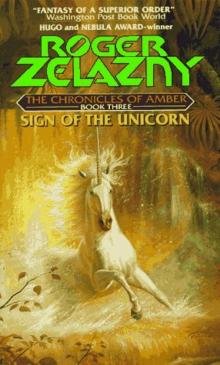 Sign of the Unicorn tcoa-3
Sign of the Unicorn tcoa-3 My Name is Legion
My Name is Legion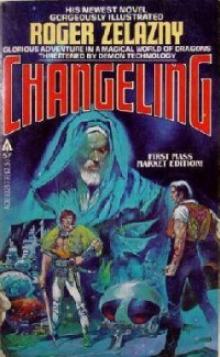 Wizard World 1: Changeling
Wizard World 1: Changeling Changeling
Changeling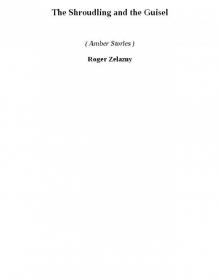 The Shroudling and the Guisel (amber stories)
The Shroudling and the Guisel (amber stories)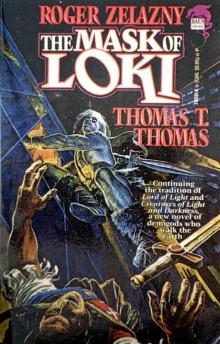 The Mask of Loki
The Mask of Loki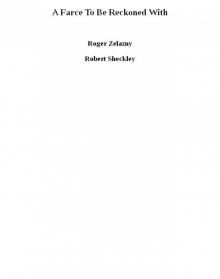 A Farce To Be Reckoned With
A Farce To Be Reckoned With Roadmarks
Roadmarks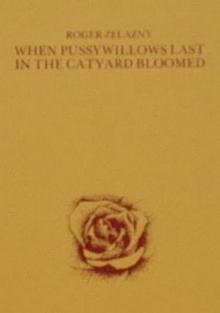 When Pussywillows Last in the Catyard Bloomed (rtf)
When Pussywillows Last in the Catyard Bloomed (rtf) Hall of Mirrors (amber stories)
Hall of Mirrors (amber stories) Permafrost
Permafrost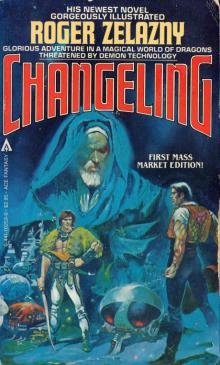 Changeling (Illustrated)
Changeling (Illustrated)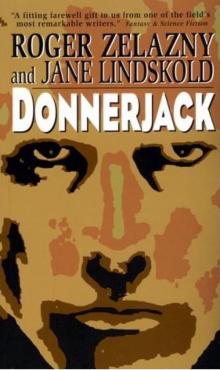 Donnerjack
Donnerjack Shadows & Reflections: A Roger Zelazny Tribute Anthology
Shadows & Reflections: A Roger Zelazny Tribute Anthology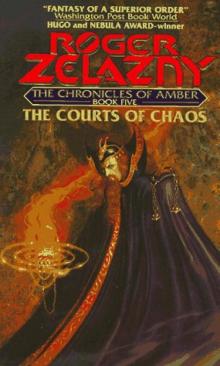 The Courts Of Chaos tcoa-5
The Courts Of Chaos tcoa-5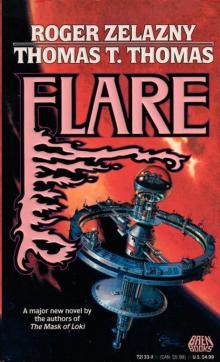 Flare
Flare Doorsways in the Sand
Doorsways in the Sand The Great Book of Amber
The Great Book of Amber Home Is the Hangman
Home Is the Hangman For a Breath I Tarry
For a Breath I Tarry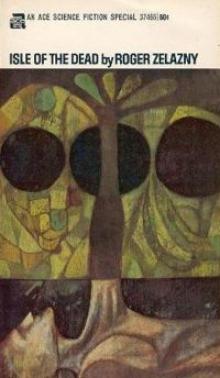 Isle Of The Dead
Isle Of The Dead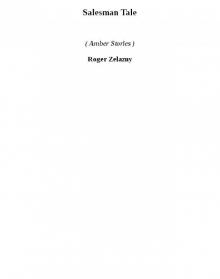 Salesman Tale (amber stories)
Salesman Tale (amber stories) Dismal Light
Dismal Light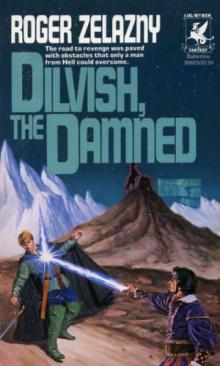 Dilvish, The Damned
Dilvish, The Damned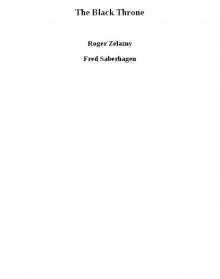 The Black Throne
The Black Throne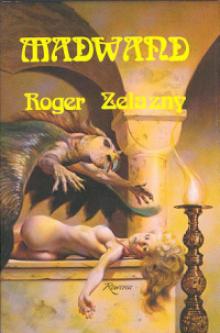 Wizard World 2: Madwand
Wizard World 2: Madwand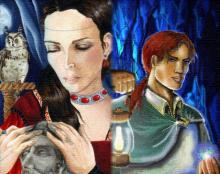 The Salesman's Tale
The Salesman's Tale